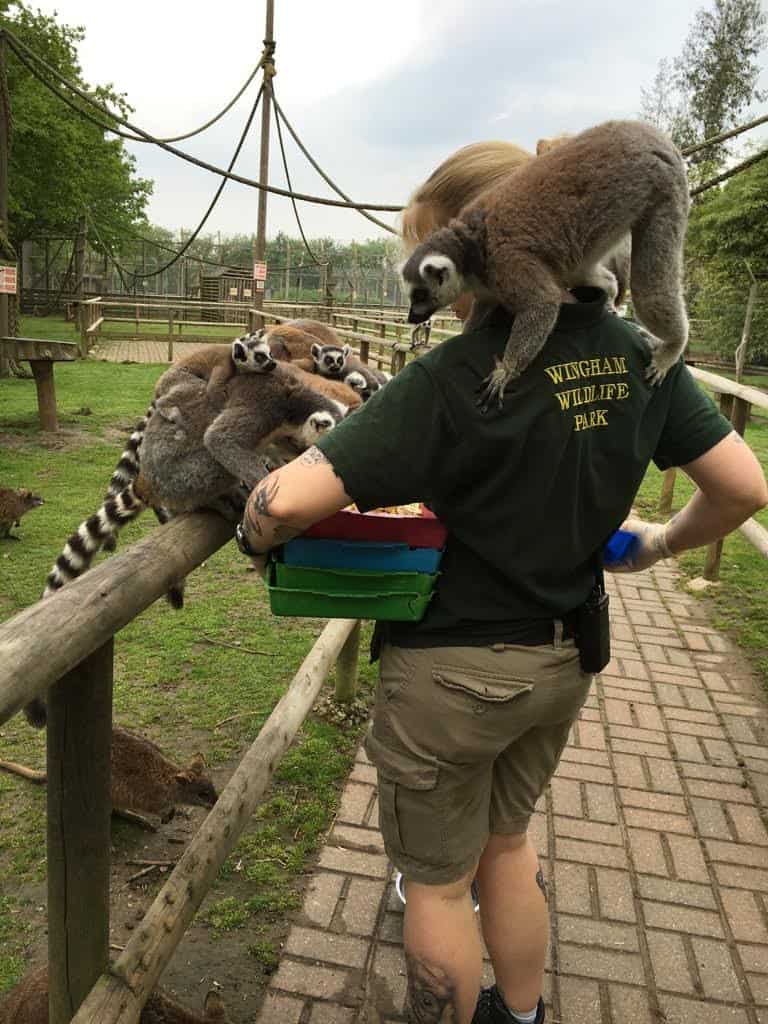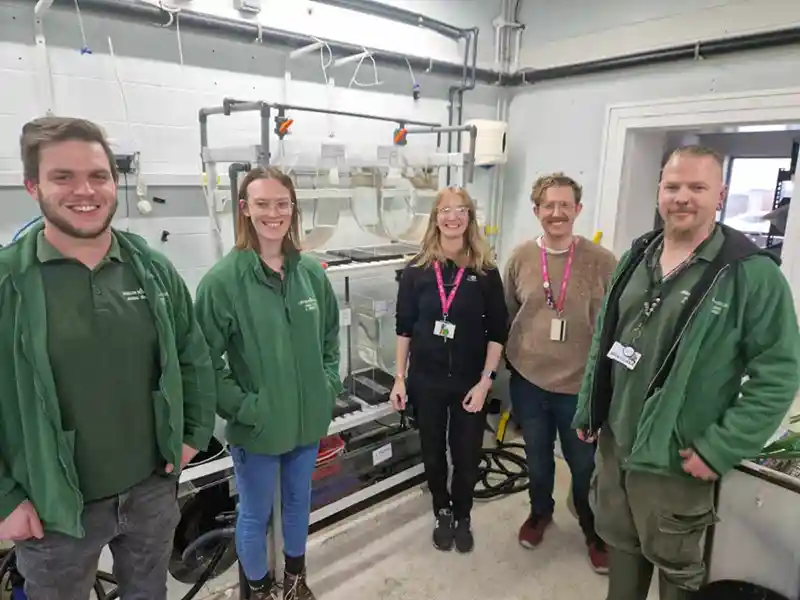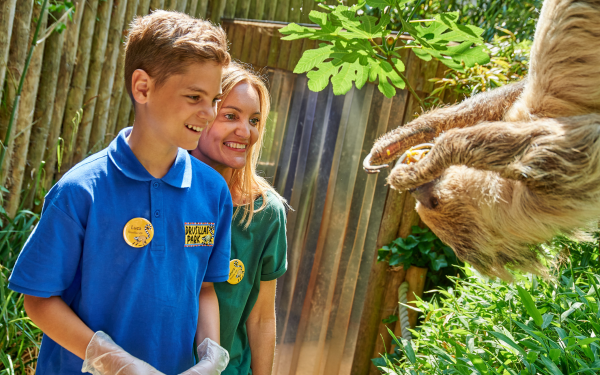How To Become A Zoo Keeper?
페이지 정보

본문
"The success of a nation and its ethical progress can be evaluated by the way its animals are treated." - Mahatma Gandhi

Do you like animals and imagine operating in a zoo? Zoo keepers are key in safeguarding wildlife and caring for zookeeper animals. At places like the Zoological Society of London (ZSL), over 20,000 animals get the care they need from professionals.
To become a zoo keeper, you require hard work, education, and a love for animals. This task is amazing, letting you work with lots of species and aid with crucial preservation work. If you're into wildlife or animal welfare, zookeeping might be best for you.

Starting your zoo keeper profession indicates learning what's needed. This guide will cover education, experience, and more. It's all you need to understand to begin a fulfilling zookeeping career.
Comprehending the Role of a Zookeeper
Exploring what a zookeeper does exposes a function loaded with difficulties and rewards. They concentrate on animal welfare and preservation. Zookeepers strive to keep animals healthy and pleased in their care.
Daily Responsibilities and Tasks
A zookeeper's day is filled with crucial tasks:

- Preparing meals that fulfill each animal's dietary needs
- Cleaning enclosures to keep them clean and safe
- Monitoring animal health and behaviour
- Giving medications and treatments as required
- Developing activities to keep animals mentally sharp
Working Environment and Conditions
Zookeepers work outside in all sort of weather condition. They handle both indoor and outdoor spaces. The job needs being physically fit and able to manage the demands of taking care of animals.
"Being a zookeeper is more than a task - it's an enthusiastic commitment to animal care and conservation."
Kinds of Animals and Specialisations
Zookeepers can specialise in many animal groups:
- Primates
- Big cats
- Marine mammals
- Reptiles
- Birds
Your role might include dealing with 2-5 different animal species. This requires a lot of understanding and the capability to adjust.
Essential Skills and Personal Qualities for Zoo Keeping
To be a leading zookeeper, you need more than simply a love for animals. Your task will be tough and require you to manage animals and people well. You'll likewise need to comprehend animal behaviour.
What zoos try to find in individuals consists of:
- Exceptional patience and emotional resilience
- Strong fitness and stamina
- Eager observation skills
- Capability to remain calm under pressure
- High level of compassion towards animals
Getting hands-on experience is key to mastering this role. You'll require to reveal:
- Advanced understanding of animal care techniques
- Proficiency in animal handling and safety procedures
- Effective communication with both animals and human visitors
"An excellent zookeeper links science, empathy, and preservation in every interaction with animals."
You ought to know about animal nutrition, behaviour, and standard veterinarian care. The majority of zookeepers learn through training, volunteering, and continuous knowing.
Zookeeper work is not just a job. It's a huge dedication to teaching about wildlife and helping conservation. Your enthusiasm and hard work will make you stick out in this fulfilling profession.
How to Become a Zoo Keeper
Starting a profession as a zookeeper needs cautious preparation and education. You should first understand the academic requirements and training courses. These will turn your love for animals into a job.
Educational Requirements
To be a fantastic zookeeper, you need a strong academic base. A lot of tasks try to find specific credentials:

- At least 5 GCSEs at grade 4 or above, consisting of English, maths, and science
- A levels or higher education credentials
- A college degree in biology or animal science
- Level 3 Diploma in Animal Management
Necessary Certifications
Getting unique accreditations can really help you in your zookeeper profession. Essential ones include:
- Diploma in Management of Zoo and Aquarium Animals (DMZAA)
- Zookeeping Level 3 Diploma (RQF)
- Animal dealing with certificates
- Emergency treatment certifications
Training Programs and Apprenticeships
Getting hands-on experience is key in zookeeper training. Numerous locations offer excellent possibilities:
- Unpaid apprenticeships at wildlife parks
- Internship programmes at popular zoos
- Practical training at locations like Colchester Zoo and Dartmoor Zoo
- Offering to get real-world abilities
Pro tip: Create a comprehensive portfolio to show your animal care skills. It will help you in task applications.
Structure Relevant Experience in Animal Care
Getting hands-on experience is essential for those wishing to be zookeepers. The task is very competitive. So, it's crucial to begin building a strong base in animal care.
Your journey begins with finding methods to work directly with animals. This is a strategic step.
"Experience is the very best instructor in animal care" - Wildlife Conservation Experts
Here work ways to gain experience working with animals:
- Volunteer at local animal shelters to establish basic animal managing abilities
- Seek internships at wildlife rehab centres
- Explore part-time positions at veterinary clinics
- Contact your local zoo for possible volunteer opportunities
Volunteering is a great way to find out about animal behaviour and care. Many zoos and animal shelters are looking for people who wish to discover. These locations use excellent chances to get hands-on experience and show your commitment to animal welfare.
Here are some tips to make the most of your experience:
- Keep a record of your skills and interactions
- Get in touch with professionals in animal care
- Request references and letters of recommendation
- Stay consistent and reveal your real passion
Remember, practical experience makes you stand out in the zookeeping world. Every time you deal with animals, you learn more. This increases your possibilities of getting a job in animal care.
Career Pathways and Professional Development
Beginning a profession as a zookeeper is exciting. It uses many chances to grow and specialise. Your journey begins with comprehending the different courses in this field.
Entry-Level Positions
Entry-level tasks in zookeeping are a great start. They provide you hands-on experience. Zoos try to find candidates with:
- Level 2 Diploma in Animal Care (minimum qualification)
- GCSEs in English and a scientific topic
- Volunteer experience at animal shelters or farms
Profession Progression Opportunities
As you get experience, your can grow. You can move up to:
- Junior Keeper
- Senior Keeper
- Team Leader
- Professional Roles
"Continuous knowing and useful experience are crucial to advancing in your zookeeping career."
Specialised Roles
You can also pick unique locations like:
- Conservation breeding programmes
- Animal training
- Wildlife research study
- Educational outreach
About 25% of zookeepers get advanced degrees in zoology or animal preservation. Getting Level 4 credentials can improve your chances for senior roles and zookeeper research study.
Working Hours and Physical Demands
Ending up being a zookeeper means you'll work more than just routine hours. You'll deal with tough physical difficulties and need to be flexible, consisting of weekends and holidays. Zoos are open every day, so you'll typically work when others relax.
"Zoo keeping is not a typical 9-to-5 task-- it's a way of life of dedicated animal care and commitment."
This task is physically demanding. You'll work outside in any weather, raising heavy products over 50 pounds. Your tasks may include:
- Early morning feeding schedules
- Cleaning animal enclosures
- Preparing specialised diet plans
- Conducting medical examination
- Maintaining intricate habitats
Shifts can start as early as 5 AM and go late into the night. You'll be on your feet the majority of the time, moving between animal zones. Weekends and holidays become part of the task, requiring lots of endurance and dedication.
In spite of the obstacles, this task has great rewards. You'll grow strong, both physically and mentally. You'll also make fantastic connections with unbelievable animals.
Health And Wellness Considerations
Being a zookeeper features its own set of difficulties. It's crucial to know how to keep both animals and personnel safe. This means following strict health and safety rules.
Zookeepers face a special environment where security is crucial. Studies reveal that health and wellness are now as important as the zoo's main work.

Risk Management Strategies
There are numerous methods to handle threats in zoos:
- Daily checks of animal enclosures for risks
- Counting animals at the start and end of shifts
- Viewing how visitors act near animals
- Being ready for zookeeper emergencies
Animal Handling Safety Protocols
Understanding which animals are most harmful is crucial. Big animals like rhinos can be really risky. There have been cases where zookeepers got seriously injured.
Security isn't just about wearing equipment - it's about understanding animal behaviour and staying alert.
Individual Protective Equipment
Zookeepers need to use the best gear, including:
- Special gloves for dealing with animals
- Strong shoes for grip and security
- Clothes that secures against germs
Getting vaccinated against illness like liver disease B and rabies is also crucial. It assists keep zookeepers healthy in their tough job.
Salary Expectations and Job Market
Considering a career in zoo keeping? It's important to understand about wages and the job market. The field is growing, with more opportunities in the UK.
Let's look at what zoo keepers can earn at various phases:
- Entry-level zookeepers start at about ₤ 14,000 a year
- Qualified ones make in between ₤ 16,000 and ₤ 22,000
- Senior zookeepers can earn up to ₤ 30,000 or more
The task outlook for zookeeper zoo keepers is excellent. The sector is expected to grow by 5% in the UK by 2029. This indicates around 3,910 new jobs will be readily available.
"The Association of Zoos and Aquariums supports expert growth for zoo keepers," a report says.
Incomes vary based upon several things:
- Experience level
- Expertise
- Where you work
- The zoo's size and type
While the pay might not be high, the delight of working with animals is valuable. The typical income is around ₤ 17,000. However, overall revenues can be between ₤ 13,000 and ₤ 27,000 a year.
Conclusion
Starting a career in animal care is an exciting journey. It requires devotion, passion, and a love for knowing. With over 350 zoos and wildlife locations in the UK, there are many job chances. You'll get to deal with remarkable animals and assist protect wildlife.
To be a zoo keeper, you require more than simply love for animals. You need to have a mutual understanding of biology, be able to interact well, and always wish to learn more. You'll gain hands-on experience, learn about animal welfare, and develop a deep respect for nature. About 3,000 people in the UK have discovered fulfilling professions in this field.
Your success in zoo keeping comes from blending science with a love for animals. Whether you're interested in mammals, birds, or marine life, this task lets you assist with preservation. Every day will bring new difficulties and discovering opportunities that will improve your skills and knowledge.
If you like animals and wish to help safeguard wildlife, zoo keeping might be for you. Take on the challenge, remain curious, and turn your passion for zookeeper animals into a rewarding career.
- 이전글Экономия на МТС ТВ акции и скидки 25.02.07
- 다음글Exploring Powerball Insights with the Bepick Analysis Community 25.02.07
댓글목록
등록된 댓글이 없습니다.
